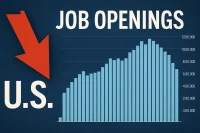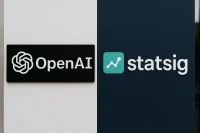JPMorgan Chase has introduced a new global leadership role aimed at overseeing the well-being and career development of its entry-level investment banking employees.
This move follows increased scrutiny on Wall Street over the treatment of young employees. There has been an increased focus after the death of a junior associate at Bank of America in May.
Ryland McClendon, a 14-year JPMorgan veteran and former head of talent and career development, has been appointed to this newly created position.
McClendon will serve as the global investment banking associate and analyst leader. He will be tasked with supporting the “well-being and success” of JPMorgan’s junior staff. This includes analysts and associates—the two lowest rungs in the investment banking hierarchy.
Workload Pressures Spark Change
The decision to create this role follows the tragic death of Leo Lukenas III.
Lukenas was a Bank of America associate who died in May. He had reportedly working 100-hour weeks on a bank merger deal.
His death reignited concerns about the excessive workload junior bankers often face. The tragedy has prompted Wall Street firms, including JPMorgan, to reassess their internal policies.
Following Lukenas’ death, JPMorgan’s CEO Jamie Dimon acknowledged the need to address these workload concerns.
To improve work-life balance, JPMorgan has introduced a new policy limiting junior bankers to no more than 80 hours of work per week. They can only work longer hours during high-pressure deal times.
The policy, introduced in August, is aimed at reducing the stress and exhaustion that many young bankers experience.
Need Career Advice? Get employment skills advice at all levels of your career
McClendon’s New Role: Prioritizing Junior Bankers’ Well-being
McClendon will work closely with junior employees to manage their workload, monitor working hours, and provide career guidance.
According to an internal memo, McClendon will also oversee training and development initiatives for junior bankers. This will help them navigate the intense work environment while ensuring that they are equipped with the necessary skills to grow within the company.
This move is seen as a proactive step by JPMorgan to reduce burnout and retain top talent.
Dimon’s Warning to Senior Bankers
JPMorgan’s CEO Jamie Dimon has been vocal about the inefficiencies in investment banking that contribute to junior bankers’ excessive workloads.
Speaking at a financial conference at Georgetown University in September, Dimon criticized some of the longstanding practices in investment banking. He said many hours worked by junior bankers are unnecessary and driven by tradition rather than actual business needs.
Dimon emphasized senior bankers would be held accountable if their teams consistently exceeded the 80-hour policy.
He warned that continued violations of the policy could impact senior bankers’ bonuses.
He said:
“A lot of investment bankers have been traveling all week, they come home, and they give you four assignments, and you’ve got to work all weekend.
“It’s just not right.”
A Shift in Wall Street’s Culture?
The changes at JPMorgan reflect a broader cultural shift on Wall Street.
Historically known for its grueling work hours and high-pressure environment, the industry has seen increasing calls for reforms as younger generations demand better work-life balance.
While junior bankers have long accepted long hours in exchange for high pay and career advancement opportunities, recent tragedies have spotlighted the need for a healthier balance.
By appointing a leader specifically focused on junior banker well-being, JPMorgan is setting a precedent that other firms may follow.
Looking Forward: Managing Workload and Career Development
As JPMorgan continues to implement these changes, the goal is to create a more supportive environment for junior bankers while maintaining the firm’s high-performance culture.
The creation of McClendon’s role is a step toward addressing the physical and emotional demands placed on young employees in investment banking.
As Wall Street firms continue to grapple with workload concerns, JPMorgan’s new policies and leadership roles may serve as a model for balancing the demands of the industry with the well-being of its workforce.




